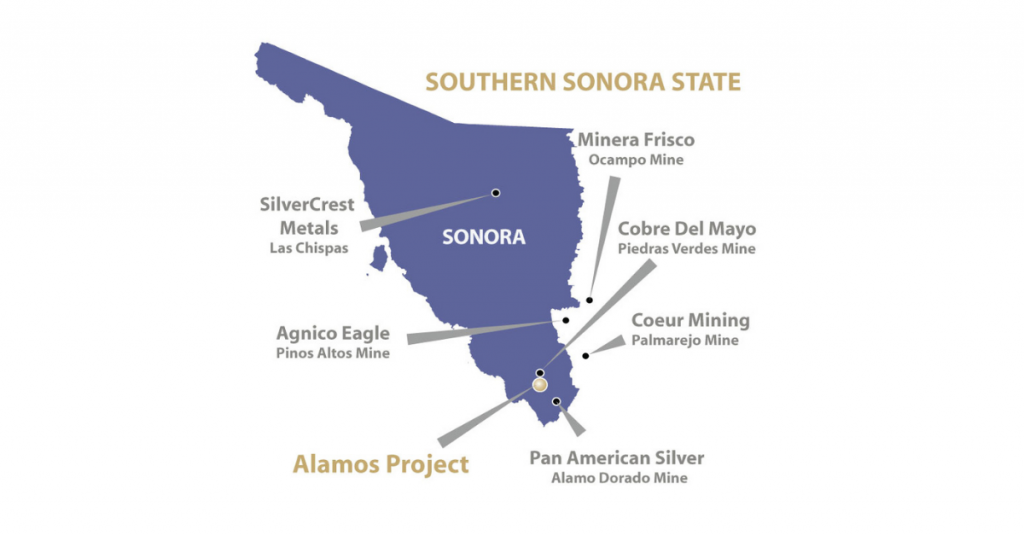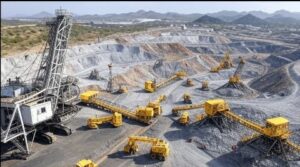Vancouver, British Columbia–(Newsfile Corp. – February 9, 2021) – Minaurum Gold, Inc. (TSXV: MGG) (“Minaurum”) is pleased to announce the final results of its 2020 Phase II drilling program at its Alamos silver project in Sonora, Mexico. Drilling at the Europa-Guadalupe target outlined a prospective south-west (“SW”) plunging silver shoot along with the potential for additional high-grade mineralization to the north and south of the area drilled. At the Promontorio target, drilling returned high-grade mineralization in excess of 100m below historical workings, indicating the potential for two SW-plunging silver shoots. Highlights include:
Promontorio zone:
- 3.70 m @ 528 g/t Ag, 0.8 g/t Au, 0.83% Cu, 2.43% Pb, 1.47% Zn, including 1.05 m @ 1,203 g/t Ag, 2.45 g/t Au, 1.42% Cu, 5.08% Pb, 2.80% Znin hole AL20-064
- 4.00 m @ 161 g/t Ag, 0.5 g/t Au, 0.24% Cu, 2.15% Pb, 5.92% Zn, including 1.00 m @ 327 g/t Ag, 0.9 g/t Au, 0.23% Cu, 2.53% Pb, 6.62% Znin hole AL20-069
Europa-Guadalupe zone:
- 3.85 m @ 342 g/t Ag, 0.76% Cu, 1.03% Zn; including 0.80 m @ 1,185 g/t Ag, 2.19% Cu, 1.2% Zn in hole AL20-054
- 3.25 m @ 196 g/t Ag, 0.26% Cu, 0.35% Pb, 1.10% Zn including 0.55 m @ 784 g/t Ag, 1.05% Cu, and 2.49% Zn in hole AL20-050
San José zone:
- 4.45 m @ 314 g/t Ag, 0.27% Cu, 0.19% Pb, 0.2% Zn in hole AL20-066
- 2.15 m @ 460 g/t Ag, 0.15% Cu, 0.47% Pb, 0.85% Zn in hole AL20-075
Travesía zone:
- 4.40 m @ 210 g/t Ag, 0.59% Cu, 1.28% Pb, 1.30% Zn, including 0.90 m @ 355 g/t Ag, 0.7 g/t Au, 1.02% Cu, 4.65% Pb, 3.24% Znin hole AL20-077
“We are pleased by the high-grade results being returned from multiple veins at the Alamos project. While drilling was impacted by the ongoing pandemic and permitting delays at the Europa-Guadalupe target, we are encouraged by results demonstrating considerable potential along strike and down dip at our top vein targets,” stated Darrell Rader, President and CEO of Minaurum. “We are finalizing plans for 2021 drilling and will be updating the market shortly.”
Promontorio Vein Zone
The reported holes were drilled as 75 to 100 m step-outs along strike and down-dip of previous drilling. Please refer to Figures 2 and 3 for locations of Promontorio zone drill holes and mineralized intersections. Assay highlights for these holes appear in Table 1.
Mineralization at Promontorio is associated with massive quartz veining hosted by a NNE-striking, 75-degree WNW-dipping fault zone. Elevated gold values and high grades of lead and zinc appear to be related to a separate pulse of mineralization that post-dates the silver-copper stage at Promontorio. Further potential lies in southwest-plunging shoots like the major shoot at the La Quintera mine, which lies on the same structure, about 1 km north of Promontorio (Figure 3).
Las Guijas section
The Las Guijas section of the Promontorio zone refers to a split off the main Promontorio vein/fault zone. Holes AL20-069 and AL20-070 followed up on holes AL19-025 and AL19-034 (see New Release dated August 22nd, 2019), drilling the Las Guijas zone about 75 and 125 m north, respectively. AL20-069 drilled 2 intervals of significant mineralization, including 1.0 m @ 327 g/t Ag, 0.97 g/t Au, and 9.5% combined base metals; and 0.45 m @ 403 g/t Ag, 1.89 g/t Au, and 22% combined base metals. AL20-070 cut the Las Guijas vein split at an oblique angle and encountered three weakly mineralized veins. The intercept in AL19-034 (1.1 m @ 729 g/t Ag) lies about 100 m below the AL19-025 and 50 m below the AL20-069 intercepts, suggesting a potential SW-plunging shoot, as shown in Figure 3. The potential shoot may be controlled in part by a NW-SE trending shoot that cuts the Promontorio zone.
Veta Grande section
Veta Grande, which occurs along the main Promontorio normal fault, dips 75 to 80 degrees to the west. The fault cuts a package of altered limestone intruded by a Laramide granitic complex with overlying Tertiary andesitic volcanic rocks and has estimated displacement of a few hundred metres. Holes AL20-043, -044, -046, and -048 stepped 75 and 150 m north of holes AL17-004 and -005 (see News Release dated October 13th, 2020). Holes AL20-062, -064, and -065 drilled the Veta Grande structure about 50 m to the south of the AL17-004 and -005 section. Hole AL20-064 cut 3.7 m @ 528 g/t Ag. Holes AL20-058 and -060 cut the Veta Grande section about 100 m north of AL20-046 and -048. These holes intersected considerable thicknesses of anomalous mineralized quartz vein. As in the Las Guijas area, the Veta Grande section has room for a southwest-plunging shoot, as shown in Figure 3.
Dios Padre section
The Dios Padre shaft was sunk in the 1890s to the level of the north end of the Promontorio adit. Minaurum drilled three holes (AL20-072, -074, and -076) to test the Promontorio vein zone in the vicinity of the Dios Padre shaft in 2020. Each of the veins encountered significant thicknesses of quartz vein hosting anomalous silver mineralization.
Europa-Guadalupe Vein Zone
The holes reported here are the vertical and lateral offsets of AL17-007 and subsequent drilling reported in News Release dated September 20th, 2020. The reported holes were drilled as 75 to 100 m step-outs along strike and down-dip of previous drilling. Assay highlights for the holes appear in Table 2. Drilling indicates the potential for a south-west plunging mineralized shoot, as shown in Figure 5.
Down-dip from AL17-007 intersection
Three holes were aimed to intersect the Europa-Guadalupe zone down-dip from the AL07-007 intercept (see News Release dated January 18th, 2018). Hole AL20-050 cut the vein zone about 100 m down dip and 40 m to the north of -007. The vein was faulted but returned 0.55 m @ 784 g/t Ag. Hole -052 aimed to intersect the projection of the Europa-Guadalupe zone about 200 m down-dip from the -007 intercept; it cut a previously unknown granodiorite which had a 25 m-wide quartz-chlorite alteration zone at the predicted vein depth. Hole -055 targeted the vein zone about 60 south and 60 m down-dip of the -007 intercept and cut 21.20 m of variably mineralized vein averaging 35 g/t Ag. The best sub-interval reported 0.90 m @ 136 g/t Ag and 0.95 m @ 105 g/t Ag.
Up-dip of AL20-047 intercept
Holes AL20-049A and AL20-051 cut the Europa-Guadalupe vein zone approximately 100 m and 200 m up-dip, respectively, of the intercept reported in hole AL20-047 (see News Release dated September 20th, 2020), about 100 m south of the AL17-007 section. Hole -049A cut 4 separate mineralized intervals in the vein zone, including 1.55 m @ 221 g/t Ag and 3.37% combined Cu+Pb+Zn. Hole -051 intersected a 7.70-m interval averaging 97 g/t Ag, including 1.45 m @ 245 g/t Ag and 0.96% combined Cu+Pb+Zn. Grade and thickness of mineralized intercepts increase down-dip from AL20-051 through AL20-049A to AL20-047 and AL17-007.
Northern extension
Hole AL20-045 intersected the Europa-Guadalupe fault zone about 100 m north of the AL17-007 intersection but the vein was cut out by a thick fault-bounded pre-mineral felsite body at the predicted depth. The dimensions of the felsite are unknown, and the vein may continue past it to the north. This area will be tested in the upcoming 2021 drill program.
Southern part of Europa zone
Holes AL20-053, -054, and -056 targeted intersected the vein zone 450 m south of the AL17-007 intersection and 100 to 200 m down dip from the vein zone’s surface expression. Hole -053 cut 3.85 m @ 165 g/t Ag, while hole -054 intersected 3.85 m @ 342 g/t Ag. Hole -056 cut 4.70 m @ 47 g/t Ag, including 0.40 m @ 286 g/t Ag and 1.07% Cu, within the granodiorite in the footwall of the main vein zone.
San José Vein Zone
The San José vein/fault zone has been traced on surface for more than 3.5 km and the reported holes were drilled as 75 to 100 m step-outs along strike and down-dip of previous drilling (see News Release dated March 1st, 2019). Please refer to Figures 6 and 7 and Table 3 for locations of San José zone drill holes and mineralized intersections.
San José shaft section
In 2020 the San José shaft section saw drilling down dip of hydrothermal/tectonic breccia containing fragments of mineralized vein material intersected in holes AL18-016 and AL19-029 (see News Release dated March 1st, 2019 and August 22nd, 2019). Holes AL20-057 and -059 were drilled down dip from AL19-029; they intersected only weak silver and base-metal mineralization related to quartz-chlorite alteration and hydrothermal/tectonic breccia. Holes AL20-061 and -063 drilled down-dip from AL18-016, which drilled under the San José shaft. Hole -061 cut only weak mineralization, while AL20-063 cut 2.05 m grading 1.48 g/t Au in a strongly chlorite-altered fault zone.
Plata Fina section of the San José zone
Three holes were drilled on the Plata Fina section in 2020: AL20-066, -068, and -071. Hole AL20-066 intersected 4.45 m @ 314 g/t Ag, hosted by hydrothermal breccia completely within granodiorite. Hole -068 cut similar breccia about 70 m to the north of the -066 intercept, but with only weak mineralization.
La Huerta section of the San José zone
The northernmost part of the San José vein zone, the La Huerta section, was first tested by Minaurum with hole AL18-015, which returned 9.6 m of 198 g/t Ag, 0.9 m of 302 g/t Ag, and 2.05 m of 181 g/t Ag from separate intervals (see News Release dated March 1st, 2019). Two holes were drilled to offset the -015 intersections. Hole AL20-073 was drilled from the same collar, but aimed to the southwest. It intersected 3.05 m @ 168 g/t, including 0.60 m @ 645 g/t Ag. Hole AL20-075, drilled from the same collar as -015 and -073, but below -015. It cut broad zones of moderate mineralization, punctuated by 8.90 m @ 143 g/t Ag, which includes 0.80 m @ 350 g/t and 2.15 m @ 460 g/t Ag. Mineralization is open at depth and along strike.
Travesía Vein Zone
The Travesía vein/fault zone is the northern continuation of the Promontorio zone and has been traced on surface for more than one km. The fault zone dips steeply to the west with the west side dropped down. The holes reported here are the vertical and lateral offsets of hole AL17-008 (see News Release dated January 18th, 2018). Please refer to Figure 8 for locations of Travesía zone drill holes and mineralized intersections. Assay highlights for these holes appear in Table 4.
Hole AL20-077 intersected the Travesía zone roughly 100 m below the AL17-008 intersection. It cut 4.40 m @ 210 g/t Ag and 3.17% combined base metals, andesitic pyroclastic rocks in the hanging wall and intrusive rocks in holes AL17-008 and AL20-077. AL20-078 cut the Travesía zone about 150 m north of the AL17-008 – AL20-077 section and intersected 1.0 m @ 81 g/t Ag. Hole AL20-079 drilled the Travesía zone approximately 100 m south of the -077 intersection. It cut a 7.50-m mineralized interval averaging 69 g/t Ag and 0.29% Cu that includes 0.90 m of 148 g/t Ag and 0.43% Cu.
Phase II Drilling Program
Phase II drilling started in mid-July of 2020. During 2020, Minaurum drilled 14,099 m in 40 holes, using 2 man-portable drill rigs. Drilling concentrated on the Europa-Guadalupe and Promontorio vein zones, with additional follow-up holes on the San José and Travesía zones. Results for the first 8 holes of the Phase II program were reported in Minaurum News Releases dated September 24th, 2020 and October 13th, 2020. The Phase II program is slated to continue in 2021, pending an improvement in COVID pandemic conditions in the Alamos region.
Table 1. Promontorio vein zone assay highlights of holes AL20-58, AL20-060, AL20-062, AL20-064, AL20-065, AL20-067, AL20-069, AL20-070, AL20-072, AL20-074, and AL20-076. See Figures 2 and 3 for hole and intercept locations. Hole depths in metres. True thicknesses of the intersections in Table 1 are estimated as 60-80% of drilled thicknesses.
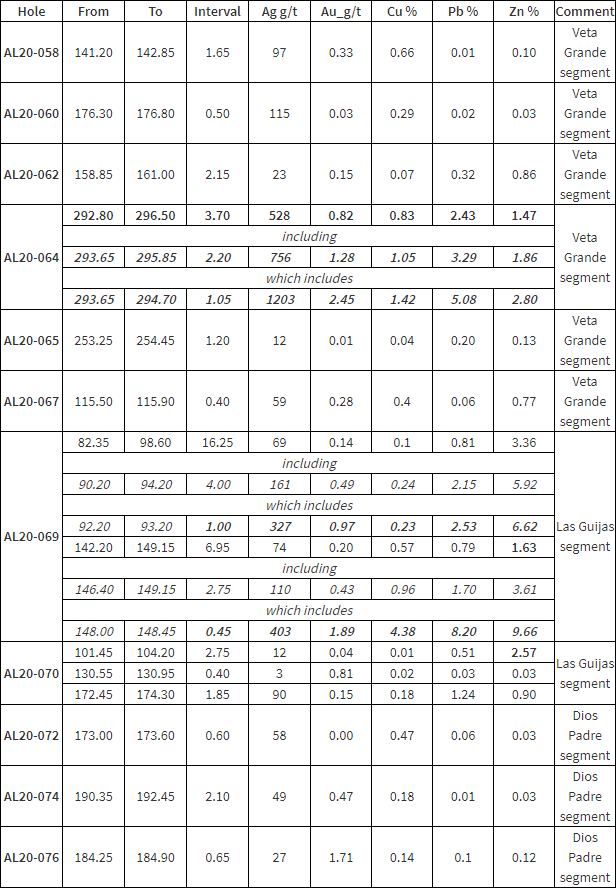
Table 2. Europa-Guadalupe vein zone assay highlights of holes AL20-049A, AL20-050, AL20-051, AL20-052, AL20-053, AL20-054, AL20-055, and AL20-056. See Figures 2 and 3 for hole and intercept locations. Hole depths in metres. True thicknesses of the intersections in Table 1 are estimated as 80-90% of drilled thicknesses.
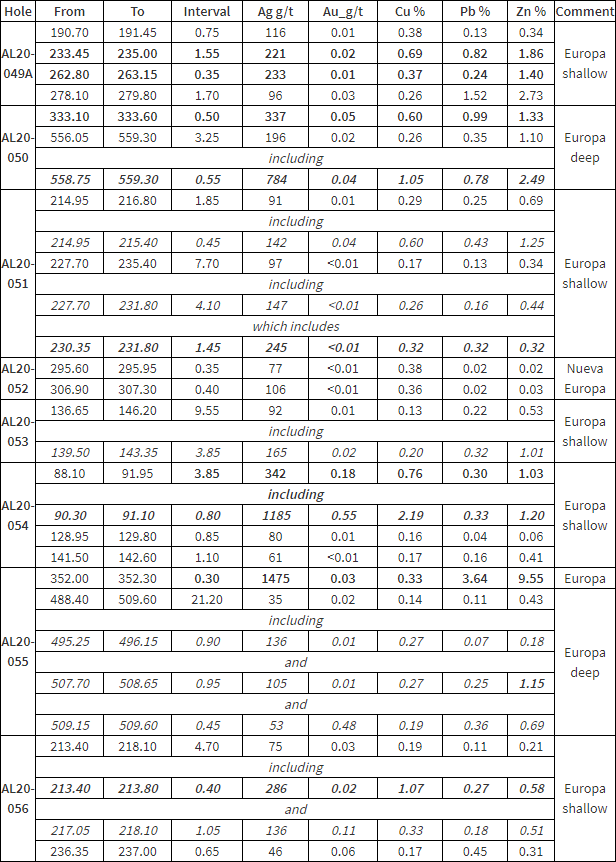
Table 3. San José vein zone assay highlights of holes AL20-57, AL20-059, AL20-061, AL20-063, AL20-066, AL20-071, AL20-073, and AL20-075. See Figures 4 and 5 for hole and intercept locations. Hole depths in metres. True thicknesses of the intersections in Table 2 are estimated as 80-90% of drilled thicknesses.
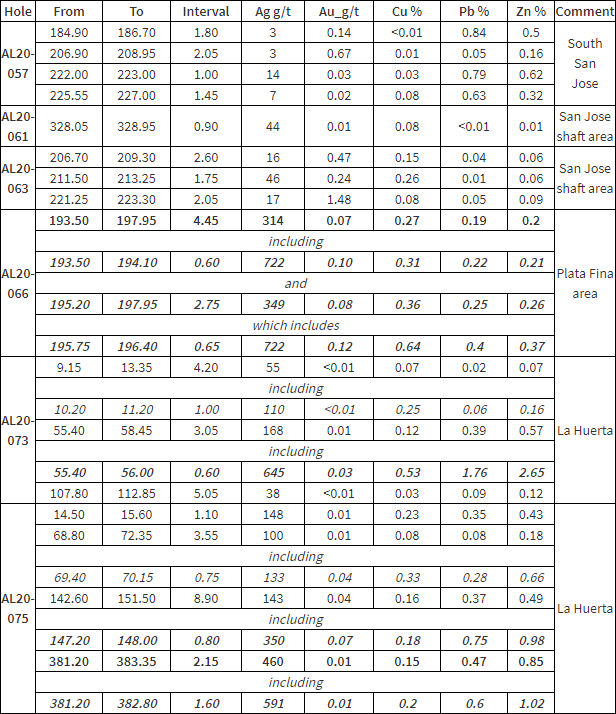
Table 4. Travesía vein zone assay highlights of holes AL20-077, AL20-078, and AL20-079. See Figures 4 and 5 for hole and intercept locations. Hole depths in metres. True thicknesses of the intersections in Table 2 are estimated as 70-80% of drilled thicknesses.
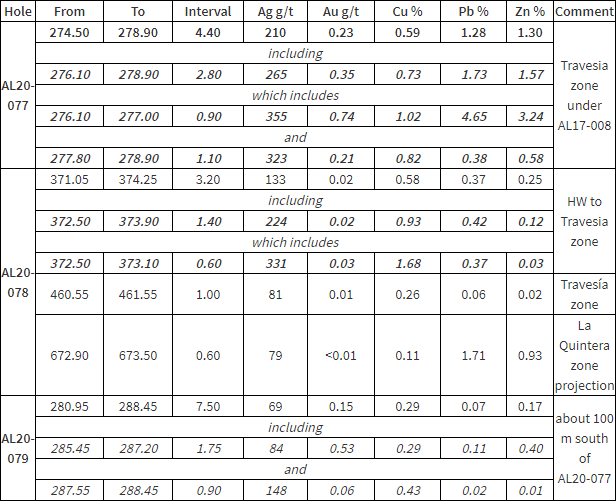

Figure 1. Phase II prioritized vein zone targets and Phase I and Phase II drilling at the Alamos project. Please click on image to view in full size.
To view an enhanced version of Figure 1, please visit:
https://orders.newsfilecorp.com/files/3455/74010_68082367e41079f4_003full.jpg

Figure 2. Promontorio vein zone, showing drill-collar locations and horizontal projections of holes. Please click on image to view in full size.
To view an enhanced version of Figure 2, please visit:
https://orders.newsfilecorp.com/files/3455/74010_68082367e41079f4_004full.jpg

Figure 3. Longitudinal section of Promontorio vein zone showing drill intercepts reported in this and previous news releases, looking N70W. Vein zone dips approximately 75 degrees away from the viewer. Note potential plunging shoots (dashed lines). Please click on image to view in full size.
To view an enhanced version of Figure 3, please visit:
https://orders.newsfilecorp.com/files/3455/74010_68082367e41079f4_005full.jpg

Figure 4. Europa-Guadalupe and Nueva Europa vein zones, showing drill-collar locations and horizontal projections of holes. Please click on image to view in full size.
To view an enhanced version of Figure 4, please visit:
https://orders.newsfilecorp.com/files/3455/74010_68082367e41079f4_006full.jpg

Figure 5. Longitudinal section of Europa-Guadalupe vein zone showing drill intercepts reported in this and previous news releases, looking WNW. Vein zone dips approximately 55 degrees towards the viewer. Note potential shoot (dashed lines). Please click on image to view in full size.
To view an enhanced version of Figure 5, please visit:
https://orders.newsfilecorp.com/files/3455/74010_68082367e41079f4_007full.jpg

Figure 6. San José vein zone drilling showing drill-collar locations and horizontal projections of holes. Please click on image to view in full size.
To view an enhanced version of Figure 6, please visit:
https://orders.newsfilecorp.com/files/3455/74010_68082367e41079f4_008full.jpg

Figure 7. Longitudinal section of San José vein zone showing drill intercepts reported in this and previous news releases. Looking WNW. Vein zone dips generally 75 degrees towards the viewer, with local complications. Please click on image to view in full size.
To view an enhanced version of Figure 7, please visit:
https://orders.newsfilecorp.com/files/3455/74010_68082367e41079f4_009full.jpg

Figure 8. Travesía vein zone drilling showing drill-collar locations and horizontal projections of holes. Please click on image to view in full size.
To view an enhanced version of Figure 8, please visit:
https://orders.newsfilecorp.com/files/3455/74010_68082367e41079f4_010full.jpg
Minaurum Gold Inc. (TSXV: MGG) (OTCQX: MMRGF) (FSE: 78M) is a Mexico-focused explorer concentrating on the high-grade Alamos Silver Project in southern Sonora. With a property portfolio encompassing multiple additional district-scale projects, Minaurum is managed by one of the strongest technical and finance teams in Mexico. Minaurum’s goal is to continue its founders’ legacy of creating shareholder value by making district-scale mineral discoveries and executing accretive mining transactions. For more information, please visit our website at www.minaurum.com and our YouTube Minaurum Video Channel.
ON BEHALF OF THE BOARD
“Darrell A. Rader“
Darrell A. Rader
President and CEO
For more information, please contact:
Sunny Pannu – Investor Relations Manager
(778) 330 0994 or via email at pannu@minaurum.com
The TSX Venture Exchange does not accept responsibility for the adequacy or accuracy of this news release.
2300 – 1177 West Hastings Street Telephone
Vancouver, BC V6E 2K3
778 330-0994
www.minaurum.com
info@minaurum.com
Stephen R. Maynard, Vice President of Exploration of Minaurum and a Qualified Person as defined by National Instrument 43-101, reviewed and verified the assay data, and has approved the disclosure in this News Release. Historical data reported in this news release has not been verified.
Cautionary Note Regarding Forward Looking Statements: Certain disclosures in this release constitute forward-looking information. In making the forward-looking statements in this release, Minaurum has applied certain factors and assumptions that are based on Minaurum’ s current beliefs as well as assumptions made by and information currently available to Minaurum. Although Minaurum considers these assumptions to be reasonable based on information currently available to it, they may prove to be incorrect, and the forward-looking statements in this release are subject to numerous risks, uncertainties and other factors that may cause future results to differ materially from those expressed or implied in such forward-looking statements. Readers are cautioned not to place undue reliance on forward-looking statements. Minaurum does not intend, and expressly disclaims any intention or obligation to, update or revise any forward-looking statements whether as a result of new information, future events or otherwise, except as required by law.
Quality Assurance/Quality Control: Preparation and assaying of drilling samples from Minaurum’s Alamos project are done with strict adherence to a Quality Assurance/Quality Control (QA/QC) protocol. Core samples are sawed in half and then bagged in a secure facility near the site, and then shipped by a licensed courier to ALS Minerals’ preparation facility in Hermosillo, Sonora, Mexico. ALS prepares the samples, crushing them to 70% less than 2mm, splitting off 250g, and pulverizing the split to more than 85% passing 75 microns. The resulting sample pulps are prepared in Hermosillo, and then shipped to Vancouver for chemical analysis by ALS Minerals. In Vancouver, the pulps are analyzed for gold by fire assay and ICP/AES on a 50-gram charge. In addition, analyses are done for a 48- element suite using 4-acid digestion and ICP analysis. Samples with silver values greater than 100 g/t; and copper, lead, or zinc values greater than 10,000 ppm (1%) are re-analyzed using 4-acid digestion and atomic absorption spectrometry (AAS).
Quality-control (QC) samples are inserted in the sample stream every 20 samples, and thus represent 5% of the total samples. QC samples include standards, blanks, and duplicate samples. Standards are pulps that have been prepared by a third-party laboratory; they have gold, silver, and base-metal values that are established by an extensive analytical process in which several commercial labs (including ALS Minerals) participate. Standards test the calibration of the analytical equipment. Blanks are rock material known from prior sampling to contain less than 0.005 ppm gold; they test the sample preparation procedure for cross-sample contamination. In the case of duplicates, the sample interval is cut in half, and then quartered. The first quarter is the original sample, the second becomes the duplicate. Duplicate samples provide a test of the reproducibility of assays in the same drilled interval. When final assays are received, QC sample results are inspected for deviation from accepted values. To date, QC sample analytical results have fallen in acceptable ranges on the Alamos project.
Original Article: https://www.newsfilecorp.com/release/74010/
